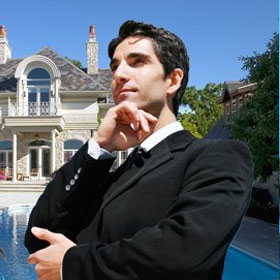Creating a Wealth Mindset
Posted on October 01, 2010 by CJ Article Team

When you consider the core reason why humans do anything, it comes down to two of our purest emotions. The strongest motivation is most commonly to Avoid Pain with a close second being to Gain Pleasure.
What do I mean by that? Think of it this way, why do you get out of bed when the alarm goes off in the morning? Is it because you have taken action on your dreams and have a business, job or lifestyle you love and you can’t wait to get stuck into your day so you can gain pleasure?
Sounds great doesn’t it, but most likely for the majority of the population it is to avoid the pain of being late for work, hitting traffic on the freeway, sideways looks from your colleagues and getting yelled at by your boss.
Relate this same concept to your wealth mindset and the decision on whether or not to buy a home or investment property. Why is it that some people decide to invest and others don’t?
It comes down to your decision making process and whether you perceive investing as pleasure or pain.
Understand that we all spend our time and money according to our highest core values. So if you value family and security then you may perceive buying a home for your family as “gaining pleasure” and avoiding the pain and insecurity of renting. You will gain pleasure in the achievement and pride of home ownership and avoiding the pain of not having a mortgage free home in retirement.
If instead you value freedom and lifestyle then you may perceive owning your own home as “pain” You may prefer to rent so you can avoid the pain of a 30 year commitment to a mortgage and gain pleasure in the flexibility of moving when you want and the ability to spend your time and money on having fun and your immediate lifestyle.
As some of you may relate, I come from European heritage and my dad is still to this day deeply entrenched in a scarcity mindset with all the associated belief systems. He was born in a small town in Italy in early 1931 and was 8 years old when WW2 was declared in 1939 and 14 years old when the Germans surrendered to the Allies in Italy in 1945. So I understand that in his formative years his “scarcity mentality” was justified as he came from a large family and food, let alone money was scarce. Unfortunately for him and many like him, although his situation has since changed, his mindset and beliefs never have. He still lives his financial life today as though he was back in wartime Italy.
My mum in contrast was born in late 1942 and was just a toddler when the war ended. Her family were more entrepreneurial with their farming, they grew their own fruit and vegetables, grew grain for flour for bread and pasta, raised chickens for their eggs and meat, pigs, plus they had goats and cows from which they used the milk to drink and to make cheese. They always had more than enough food for the family and also sold the extra grain, eggs, fruit, veg and milk etc for money which they used to buy non food items.
Your earliest money beliefs originate from either your father or mother, or significant guardian, during your formative years. As you start to live your own financial life you either model one parent’s beliefs or do the complete opposite and rebel against their beliefs entirely. However, as you mature, start work and leave home you develop your own money beliefs which result in your personal financial situation.
If I look back at my financial history, I see that I have predominately modelled my mother’s core money beliefs of “enough plus a little bit more”, however my risk profile is greater than my mother’s so obviously it’s to a larger scale with my business and properties. However, being raised by a parent with a scarcity mentality has left its mark and I have to admit that I still catch myself having conversations with the “scarcity” demon while my financial focus is on growing my business and my portfolio. I often have to stop and ask myself “am I withholding this spending because of lack or scarcity or because it makes sense for my current goals?”
So my first question to you is, who’s money beliefs did you adopt as a child and how has that influenced your current financial status as an adult?
That’s not to say that you can live your life in effect and blame your parents for your financial situation and say “it’s your fault, you made me this way”. You are an adult, you must be accountable and take full responsibility for your life, your decisions and your own money beliefs, regardless of where they may have originated. You earned and spent the money.
Awareness however, is the first step in making a change. If you recognize some beliefs you may have adopted from your parents along with your own money beliefs are disempowering to your financial situation, then change them. Model the beliefs of someone who is wealthy, financially successful and has created the results you want to create in your own life.
Up until a few years ago, I used to think relatively small. I had two homes, a homeowner’s mindset and therefore a full time job to support them. I no longer wanted the full time job so my homeowner mindset thought “downsize”. I considered selling both my homes in order to buy my dream cottage on acreage with a small mortgage so I only had to work part time seeking the lifestyle and balance I craved.
Thanks to everything I learnt from Chris Howard, Robert Kiyosaki, Richard Branson and Donald Trump I now think bigger, I think “upsize”. Not only did I realise that I have to Think Big, but I learnt that in order to be financially successful you have to put aside any negative money beliefs and Think Rich. You will never get rich by selling your assets, you will only get rich by accumulating more assets.
Some may wonder if the desire to create wealth is greedy? I think that the opposite is selfish. How can you be expected to help others, your family or friends, your charities and the needy in the world if you can’t even help yourself? You can’t help the poor if you are the poor.
So 2 years ago I took a huge leap of faith towards my dreams and goals and dramatically changed my mindset and subsequently my life in a profound way. I let go of limiting beliefs that had previously held me back and I took massive action to create wealth by quitting my job, investing in educating myself and becoming both a property investor and a business owner.
Now I am not suggesting you also quit your job to follow your dreams without thorough financial and business planning, but ask yourself.. What is the current financial pain I am trying to escape and the pleasure I am trying to gain. How can I change my results by changing how I associate the commitment to wealth creation with pleasure and not pain. How can I associate pain to my current lifestyle of immediate gratification and excess spending. How best can I balance living today with planning for tomorrow.
Start your journey to Wealth by not only Thinking Big, but Thinking Rich…
Ensure you develop what they call a “millionaire hook” which is the ability to see the big picture and also the knowhow to drill down to the detail. You need to ensure you have a crystal clear vision of your dreams, which will keep you inspired and focused and convert them into smaller manageable goals. Then pay attention to the small details which will become your processes and action steps. Steps without a larger vision will lack direction and a vision without clear action steps is just a dream.
Start early and use the power of compounding to propel you forward. Even if you are starting from nothing, automatically put aside a minimum of 10% of your income to create wealth in a high interest account. Figure out how to earn more income and save every cent you can to pay off your consumer debt and get into your first home to start building your equity. If you cannot afford your own home, then consider your first investment and let the tenant and tax man help you save for your own home.
You have to work smarter and not harder. You have to start making your money work for you, rather than always working for it. You must build assets or you will find yourself in a situation of trading your time for money in a job for the rest of your life, even if you are your own boss. Is that what you want?
Once you have a deposit or equity in your own home then borrow the balance and use the power of leverage. Make tax deductable investment debt your friend. I used to consider a mortgage or “debt” as something that had to be paid off and this caused me pain. I now consider “debt” as merely a tool in my investing tool belt that helps me to create wealth and this gives me great pleasure. I don’t ever plan to pay down my investment mortgages, instead I plan to shrink them in comparison to the asset they are secured against. Why would I want to pay of the mortgages on my investments today when $1 = $1. With time, the value of my assets will rise and the value of money and the property debt will shrink. I will use my money to build my portfolio, my assets, my cash flow buffer and my wealth.
If I have a property worth $300,000 and I owe $300,000 why would I want to pay this off now when I can pay it off in 20-30 years when it is worth a quarter of what it is worth today and the Loan to Value Ratio (LVR) is negligible? ie.
In Year 0, the Asset is worth $300K and the Debt is worth $300K, which is 100% LVR
In Year 7, the Asset is worth $600K and the Debt is worth $300K which is 50% LVR
In Year 14, the Asset is worth $1.2 Mill and the Debt is worth $300K which is 25% LVR
In Year 21, the Asset is worth $2.4 Mill and the Debt is worth $300K which is 12.5% LVR
However, as your money grows so should your own education in finance and investing, the quality and experience level of your advisers and your assets themselves.
Only ever take advice from someone who specialises in your field and with property specifically, someone who has more properties than you. General belief is that you spend approximate 1-2% of your portfolio value on your annual education and advisers so you can leverage of their knowledge and experience.
This way you will always stay informed, continually educated and at the top of your game.
Facebook Comments:

































